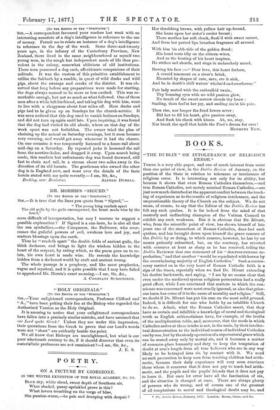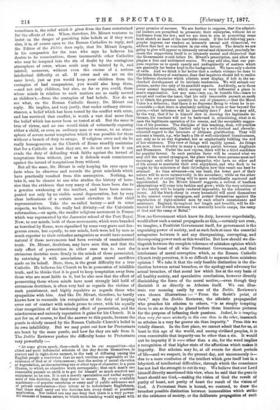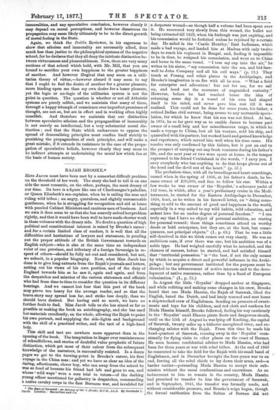BOOKS.
"THE DUBLIN" ON INTOLERANCE OF RELIGIOUS ERROR.*
THERE is a very able paper, and one of much interest from more than one point of view, in the Dublin Review of January, on the position of the State in relation to tolerance or intolerance of religious error. It is interesting not only for its ability, but because it shows that even Roman Catholics themselves,—and true Roman Catholics, not merely nominal Roman Catholics,—are just now much disturbed at the apparent conflict between the teach- ing of experience as to the results of religious intolerance, and the unquestionable theory of the Church on the subject. We do not mean, of course, to say that the Editor of the Dublin Review has felt any such qualms. it is far indeed from the mind of that masterly and unflinching champion of the Vatican Council to exhibit any such weakness. But it is obvious that Dr. Alivart, who, from the scientific point of view, has shown himself of late years one of the staunchest of Roman Catholics, does feel such qualms, and has brought down upon himself the grave censure of the Dublin by so doing, to which censure, however, he has by no means patiently submitted, but, on the contrary, has retorted with censures at least as sharp as he has received, telling the Dublin Reviewer that one statement of his "deserves extreme re- probation," and that another "would be repudiated with horror by the overwhelming majority of English Catholics." Such a contro- versy carried on in the very heart of Roman Catholic faith is a sign of the times, especially when we find Dr. Mivart extending 1 his doubts backwards, and saying, "I am by no means clear that even under the medimval system religious persecution had a really good effect, while I am convinced that matters in which the con- science was concerned were most cruelly ignored, as also that griev- ous harm has come of it to the cause of morality and religion." Still, we doubt if Dr. Myatt has put his case on the most solid ground. Indeed, it is difficult for one who holds by an infallible Church to do so. Admit, what the Roman Catholics assert, that they have as certain and infallible a knowledge of moral and theological truth as English arithmeticians have, for example, of the truths of the multiplication-table, and, moreover, that the mode in which Catholics arrive at these truths is not, in the main, by their intellec- tual demonstration to the individual reason of individual Catholics one by one, but by the steady operation of a supernatural grace which can be scared away only by mortal sin, and it becomes a matter of common-place humanity and duty to keep the temptation of doubt at arm's length from all true believers who are in any way likely to be betrayed into sin by contact with it. We need no such precaution to keep men from teaching children bad arith- metic, because their daily experience will very soon convince those whom it concerns that it does not pay to teach bad arith- metic, and the pupils and the pupils' friends that it does not pay to learn it. But once let error have all the fascination of sin, and the situation is changed at once. There are always plenty of persons who do wrong, and of course one of the greatest of all temptations to moral and theological doubt may be, and
• The Dublin Bedew, January, 1877. London: Burns, Oates, and Co.
sometimes is, the relief which it gives from the fears entertained for the effects of sins. When, therefore, Dr. Mivart ventures to insist on the danger of punishing false beliefs as if they were sins, it is, of course open to the Roman Catholics to reply, and the Editor of the Dublin does reply, that Dr. Mivart forgets, in his compassion for the man who says he believes his doubts to be conscientious, those innumerable other Catholics who may be tempted into the sin of doubt by the contagious atmosphere of error, whose souls may be tainted by it, and tainted, moreover, without even the excuse of a serious intellectual difficulty at all. If error and sin are on the same level, just as you would keep your children from the contagion of bad companions, you would also keep them, —and not only children, but also, so far as you could, those whose minds in relation to such matters are as easily moved as children's,—from the contagion of bad beliefs. Nor do we see what, on the Roman Catholic theory, Dr. Mivart can reply. He implies, and very justly, that under ordinary circum- stances, a belief which has been tested by the conflict with error, and has survived that conflict, is worth a vast deal more than the belief which has never been so tested at all. But the same is true of virtue, and no one would think of voluntarily exposing either a child, or even an ordinary man or woman, to an atmo- sphere of severe moral temptation which it was possible for them without a breach of duty to escape. If religious error and sin be really homogeneous, as the Church of Rome steadily maintains that for a Catholic at least they are, we do not see how it can evade the duty of defending weak faiths against the inroad of temptations from without, just as it defends weak consciences against the inroad of temptations from without.
But all the same, Dr. Mivart is only keeping his eyes open to facts when he observes and records the great mischiefs which have practically resulted from this assumption. Nothing, we take it, can be clearer to one who studies the history of here- sies than the evidence that very many of them have been due to a genuine awakening of the intellect, and have been accom- panied not only by no visible moral degeneration, but by very clear indications of a certain moral elevation in their chief representatives. Take the so-called heresy—and in some respects, we believe, the really bad divinity—of the Calvinistic reformation,—or again, the smaller religious movement in France which was represented by the Jansenist school of the Port RoyaL Now, to our minds, both of these movements, which were branded as heretical by Rome, were signalised by some very grave and dan- gerous errors, but equally, to our minds, both were led by men as much superior to their orthodox antagonists as would have seemed natural if these movements had been revivals of unadulterated truth. Dr. Mivart, doubtless, may have seen this, and that the only effect of persecution in either case was to root the erroneous doctrine more firmly in the minds of those persecuted, by entwining it with associations of great moral sacrifices made on its behalf. Here, then, is the great difficulty for a true Catholic. He believes his Church to be in possession of infallible truth, and he thinks that it is good to keep temptation away from those who are most liable to it, but he also sees that the effect of persecuting those whose minds have most strongly laid hold of erroneous doctrines, is often very bad as regards the victims of such punishment, and highly repulsive as regards those who sympathise with him. And like Dr. Mivart, therefore, he hardly .knowe how to reconcile his recognition of the duty of keeping error out of contact with minds prone to error, with his equally clear recognition of the hardening effect of persecution, and the mischievous and unlovely reputation it gains for his Church. It is not for us, of course, to find the answer to this puzzle, because the puzzle is chiefly caused by the Roman Catholic Church's belief in its own infallibility. But we may point out how far Protestants are beset by the same puzzle, and how far they are safe from it. The Dublin Reviewer pushes the difficulty home to Protestants very powerfully :—
"At some given epoch, then—such is to be our supposition—the ablest and most influential atheists of the day devote themselves, in concert and in right-down earnest, to the task of diffusing among the English people a conviction that no such verities are cognisable as the existence of God or of virtuousness ; that the notion of moral elevation or degradation, as characterising one or other type of character, is a pure illusion, to which no objective truth corresponds ; that each man's one reasonable pursuit on earth is to get for himself as much comfort and enjoyment as he can. It is not a merely speculative and verbal accept- ance of this doctrine, that they desire to secure. By every available machinery—of popular catechism or essay and' of public addresses and of private conversation—they labour so to indoctrinate Englishmen, that these shall carry out the doctrine into every detail of practical application. Nor indeed can any one deny that there is a very power- ful element of human nature, to which such teaching would appeal with great promise of success. We are further to suppose, that the atheisti- cal leaders are permitted to prosecute their enterprise, without let or hindrance from the law ; and we are then to aim at presenting some faint sketch at least of the inevitable result. If the few following para- graphs impress our readers as intensely unreal and chimerical, we that fact as conclusive in our own favour. The details we are
going to give will appear so intensely unreal and chimerical, precisely be- cause the supposition itself is so intensely unreal and chimerical that the Government would follow Dr. Mivart's prescription, and allow the plague a free and unfettered course. We may add also, that our pur- pose requires us to speak openly and undisguisedly of matters which are generally far better kept in the background. We have only a choice of evils. And we think it far better that a certain violence be done to Christian delicacy of sentiment, than that inquirers should fail to realise the hideous character which atheism must display, if left to the un- checked development of its intrinsic tendencies. We will submit our picture, under two only of its manifold aspects. And firstly, as to those lower animal impulses, which occupy so very influential a place in man's organisation. Let any man—say, e.g., in humble life—learn to accept and realise the tenet, that his only reasonable pursuit on earth is to obtain the greatest quantity he can of pleasure ;—that the Moral Voice is a delusion ; that there is no Supreme Being to whom he is ac- countable ;—that there is absolutely nothing to hope or fear beyond the grave,—what inference will he inevitably draw ? And we may add, by the way, that if he is himself slow in drawing the legitimate in his teachers will not be backward in stimulating, what is at once the legitimate operation of his reason, and the acceptable sugges- tion of his passions. The disciples of this teaching, then, will practise unscrupulous sensuality, limited only by a well-devised and cleverly. adjusted regard to the interests of ultimate gratification. They will account a female, e.g., who leads a life of well-calculated licentiousness, not only as in no way degraded, but as emphatically fulfiling the end of her existence. This view of things will rapidly spread. As things are now, there is rivalry in many a country parish between Anglicans and Dissenters. Under the new re-gime, there will be a third candidate for popular favour. In such parishes there will be created what we may call the carnal synagogue, the place where those persons meet and encourage each other by mutual sympathy, who have no other end of life except to maximise their own enjoyment, and who flock to be taught by the ministers of their (ir)religion how this result can best be attained. As time advances—on one hand, the lower part of their nature will be more unreservedly in the ascendant; while on the other hand, the art of carnal living will be more scientifically mastered and apprehended. As Dr. Mivart himself suggests, a revival of heathen abominations will come into fashion and grow ; while the very existence of the family will be largely rendered impossible, by the toleration of incest. All the black-sheep in every household will enrol themselves in the nearest carnal synagogue, and protect themselves against the reprobation of right-minded men by each other's countenance and assistance. England, throughout her length and breadth, will be dis- tracted by her division between two mutually hostile camps, the camp of God and the camp of Belial."
Now, no Government which knew its duty, however superficially, would allow such a carnal propaganda as this,—certainly not even, we imagine, a Positivist Government itself, for government is the organising power of society, and as such feels at once the essential antagonism between it and any disorganising, corrupting, and decomposing power such as this wouldbe. But how should we dis- tinguish between the complete tolerance of mistaken opinion which is now the boast of all wise Protestant Governments, and that intolerance of moral corruption which, as the Roman Catholic Church truly perceives, it is so difficult to separate from mistaken opinion ? We take it that the only feasible distinction is the dis- tinction between actual breaches, or the apology and advocacy for actual breaches, of that moral law which lies at the very basis of all healthy society, and speculative conclusions, however directly diminishing the force of the moral motive,—even though they diminish it as directly as Atheism itself. We can illus- trate our meaning easily by one of the Dublin Reviewer's own chosen illustrations :— "From the theist's point. of view," says the Dublin Reviewer, the atheistic propagandist who preaches his atheism to others, "is as simply tempting them to sin as though he placed before them licentious pictures for the purpose of inflaming their passions. indeed, he is tempting them very far more wickedly in this case than in the other, inasmuch as atheism is a very far graver sin than impurity." From this we totally dissent. In the first place, we cannot admit that for us, at least in this age of the world, and among civilised peoples, it is even conceivable that impurity can be other than a sin. It would not be impurity if it were other than a sin, for the word implies- a recognition of that higher state of the affections which makes it impurity. But atheism may be, at all events for short periods of life—and we suspect, in the present day, not uncommonly is— due to a mere confusion of the intellect which gets itself lost in a labyrinth of intellectual difficulties, through which the conscience has not had the strength to cut its way. We believe that our Lord himself directly sanctioned this view, when he said that the pure in heart should see God,—making the vision of God the result of purity of heart, not purity of heart the result of the vision of God. A Protestant State is bound, we contend, to draw the broadest possible distinction between immoralities which strike at the existence of society, or the deliberate propagation of such
immoralities, and any speculative conclusion, however closely it may depend on moral perceptions, and however disastrous its propagation may seem likely ultimately to be to the direct growth of moral feeling in the State.
Again, we think the Dublin Reviewer, in his eagerness to show that atheism and immorality are necessarily allied, does much less than justice to the philosophical systems of the negative school, for he declares that they all deny the intrinsic distinction be- tween virtuousness and pleasurableness. Now, there are very many sections of that school which hold, with Mr. Mill, that you are bound to sacrifice your own happiness to the greater happiness of another. And however illogical that may seem on a utili- tarian theory of virtue,—however absurd it may seem to say that I ought to feel the desire of another for a greater pleasure, more binding upon me than my own desire for a lesser pleasure, yet the logic or no-logic of the utilitarian system is not the point in question. The question is whether or not all Atheistic systems are purely selfish, and we maintain that many of them, througlt a happy triumph of conscience over imperfect premisses of thought, are not so, but are in effect and in working often highly unselfish. And therefore we maintain that our distinction between speculative atheism and the propagandism of immorality is not merely an intellectual, but a very substantial moral dis- tinction; and that the State which endeavours to oppose the spread of demoralising principles must confine itself strictly to punishing the propagandism of such principles, and will make a great mistake, if it extends its resistance to the case of the propa- gation of speculative beliefs, however clearly they may seem to be indirect attempts at undermining the moral law which lies at the basis of human society.




































 Previous page
Previous page